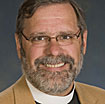Commentary on Psalm 145:1-8
As a response to the first lesson, Psalm 145 was chosen to show how Jonah knew that God was “merciful, slow to anger, and abounding in steadfast love, and ready to relent from punishing” (Jonah’s version of verse 8).
But even with that prooftext connection the psalm is an odd companion to the reading from Jonah in that the psalm celebrates God’s gracious character while Jonah, God’s own prophet, resents it.
A sermon developed around this connection will likely end up being more about Jonah than the psalm. The psalm tells us that God’s people pass the stories of God’s work, power, and character down through the generations. The issue to ponder here is why in that process God’s people tend to narrow God’s broad mercy and nationalize the international scope of God’s care. God’s own words in Jonah 4:11 make God’s commitment clear: “And should I not be concerned about Nineveh?” Yet Jonah, who knows the stories, thinks not.
It might be fruitful, if fanciful, to imagine a different connection between Psalm 145 and the first lesson. The psalm could be put onto the lips of the king and people (and even the animals!) of Nineveh as they celebrate their deliverance as God relents from the violence God had intended to rain down on them. Imagine cows throwing off their sackcloth and dancing. A sermon developed around this vision would still have to rely heavily on the psalm’s lectionary connection to Jonah.
But in it the preacher might dare to celebrate all the formerly oppressed people who now sing Psalm 145 after being liberated by the Word of God — even when that Word was delivered to them with little enthusiasm or (worse) with the intent of endorsing their oppression. Perhaps the real “sign of Jonah” is that slaves, women, GLBTQ people, and countless others have heard in the stories of God their freedom proclaimed, even when the storytellers are their oppressors!
Those who elect to tackle preaching on this psalm on its own terms (without reference to the lectionary setting) will face three tricky but surmountable issues.
First is the lack of tension in the psalm. In the appointed verses it’s all good! Simone Weil (among others) has pointed out that as deeply interesting as love and goodness are in real lived life, when it comes to literature (sacred as well as secular), lack of trouble — obstacle, burden, threat, Law — is boring.
It is only when we read to verses 14-20 in the psalm that we encounter the “falling,” the “bowed down,” and the hungry; only then does the outline of a compelling narrative start to emerge. In the appointed verses, narrative tension is only implied — the preacher will have to supply details of the concrete historic actions of God (and the troubles they addressed) to which the psalmist might be referring.
A second tricky issue is locating the current audience (by which I mean whatever Christian community you are preaching to) in the stories and actions that the psalm celebrates. When the psalmist’s generation praises God’s works to the next, that praise is for specific historic political acts. These acts involved God taking sides and making judgments in relation to specific events in the lives of God’s people — among them: migration, Exodus, conquest (as both conqueror and conquered), exile, and return.
It is appropriate for all of God’s people to publish the remembrance of God’s great goodness. But if a sermon on Psalm 145 is to bring that publication home, the preacher will first have both paint a convincing picture of how God’s action then predicts God’s action now and second will have to dare to identify God’s likely disposition now to the sides to be taken and judgments made. If the United States or the Christian Church is playing a role more akin to Pharaoh or Babylon than to slaves or exiles, the remembrance of God’s action takes on a tone less celebrative than the one in Psalm 145.
This brings us to the third tricky issue. When I’m sitting in the pew on September 18 I’d like to hear testimony about whether and how God continues to mightily act in the world, in economies and politics. On account of which concrete historic works of God will we “praise God to the next generations”? What does it mean really to “tell of the might of [God’s] wondrous acts”?
What I’m about to say would not be true for all Christians, but in the discipleship communities of which I’m a member, the perceived arena for God’s concrete involvement is a bit smaller than the psalmist’s. Sure, a few in my circle believe that God intervenes “contrary to nature” in order to heal tumors or keep airplanes aloft. But most of my pew-mates are functional deists who believe that God established the deep processes of creation, set them in motion, and now watches (with love and mercy but sans meddling) as things play out — a subset of this group believes that Jesus reveals the deepest of those deep processes to be the paradoxical power of self-giving.
Others testify that God roams freely and acts mightily only in the personal spiritual realm of their souls, families, congregations and a few will also grant the presence of Holy Spirit at synod and churchwide assemblies. But they would be reluctant to proclaim God’s hand at work in addressing the unemployment rate or peace in the Middle East. Tell us, preacher, is Psalm 145 grandiose pious hyperbole or is there something concrete, historic, and global for us to sing about to our next generations?

September 18, 2011